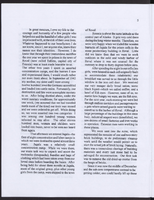Search the Special Collections and Archives Portal
Search Results
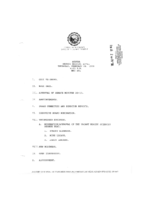
Meeting minutes for Consolidated Student Senate University of Nevada, Las Vegas, February 22, 1990
Date
1990-02-22
Archival Collection
Description
Includes meeting agenda and minutes. CSUN Session 20 Meeting Minutes and Agendas.
Text
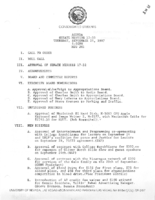
Meeting minutes for Consolidated Student Senate University of Nevada, Las Vegas, September 24, 1987
Date
1987-09-24
Archival Collection
Description
Includes meeting agenda and minutes with additional information about senate bills. CSUN Session 17 Meeting Minutes and Agendas.
Text
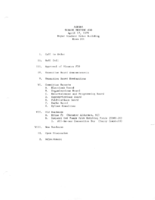
Meeting minutes for Consolidated Student Senate, University of Nevada, Las Vegas, April 17, 1979
Date
1979-04-17
Archival Collection
Description
Includes meeting agenda and minutes with additional information about the senate bylaw. CSUN Session 7 Meeting Minutes and Agendas.
Text

Meeting minutes for Consolidated Student Senate University of Nevada, Las Vegas, March 1, 1999
Date
1999-03-01
Archival Collection
Description
Includes meeting agenda and minutes.
Text
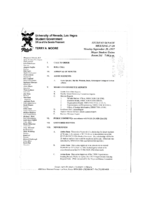
Meeting minutes for Consolidated Student Senate University of Nevada, Las Vegas, September 29, 1997
Date
1997-09-29
Archival Collection
Description
Includes meeting agenda and minutes.
Text
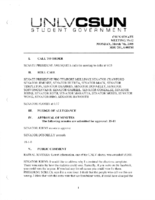
Meeting minutes for Consolidated Student Senate, University of Nevada, Las Vegas, March 07, 2005
Date
2005-03-07
Archival Collection
Description
Includes meeting minutes and agenda.
Text

Meeting minutes for Consolidated Student Senate, University of Nevada, Las Vegas, January 27, 2003
Date
2003-01-27
Archival Collection
Description
Includes meeting minutes and agenda, along with additional information about the Constitution of Student Alliance, memorandums, and broadcaster agreements.
Text

Meeting minutes for Consolidated Student Senate, University of Nevada, Las Vegas, February 26, 2001
Date
2001-02-26
Archival Collection
Description
Includes meeting minutes and agenda, along with additional information about bylaws.
Text
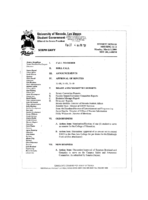
Meeting minutes for Consolidated Student Senate, University of Nevada, Las Vegas, March 05, 2001
Date
2001-03-05
Archival Collection
Description
Includes meeting minutes and agenda, along with additional information about CSUN Rebel Radio prepositions.
Text
Pagination
Refine my results
Content Type
Creator or Contributor
Subject
Archival Collection
Digital Project
Resource Type
Year
Material Type
Place
Language
Records Classification

